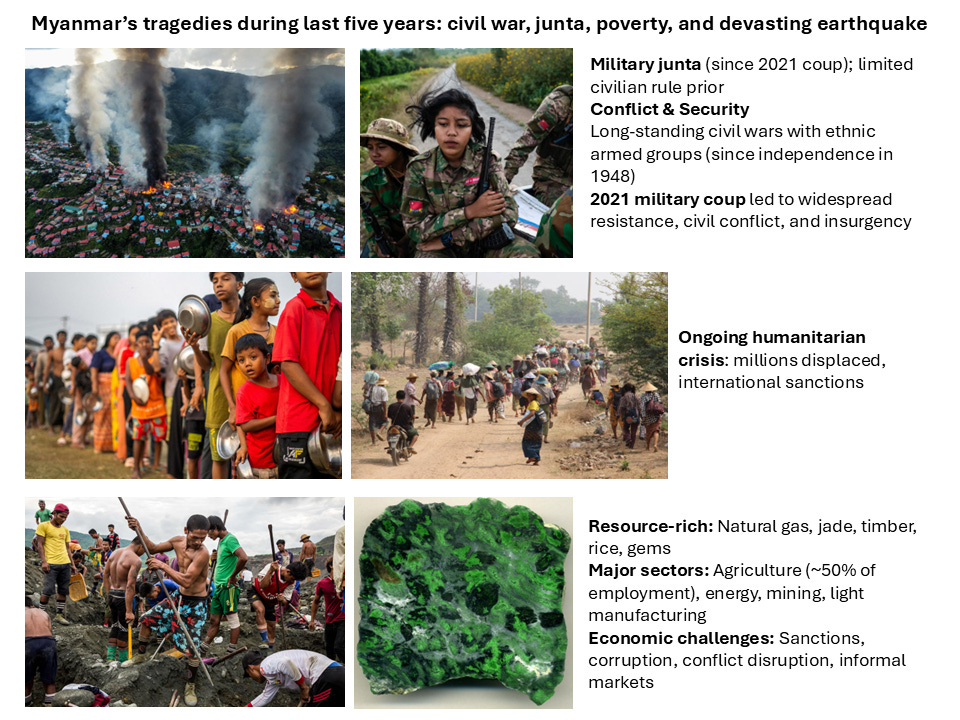Earthquake Tears Through Myanmar (Part 4)
The junta's poor humanitarian response, and China is the best candidate for preventing an humanitarian crisis
The regime’s humanitarian response to the disaster has been meager, disjointed, politically selective, and historically consistent with past disaster responses and provides the opposition an opportunity for a nationwide leadership role. Aid has been prioritized for loyalist areas while opposition zones remain cut off. Hospitals, already short-staffed after junta purges, are overwhelmed and damaged. Dozens have been killed by the junta’s troops since the earthquake despite a cease-fire. Meanwhile, opposition networks, relying on volunteers and their defense forces, have stepped in to deliver aid in hard-hit areas. If opposition groups can further unite, coordinate and upscale their response, and if international actors re-route support away from the corrupt and inefficient efforts of the junta, a pathway could open towards meaningful leadership transformation. Creative destruction could become more than a theory. As the junta fails the victims of the earthquake, struggles economically and militarily with its aftermath, an alternative government could rise from a united opposition, but not without China’s tacit approval and significant assistance.
China is the only external party with the proximity, in-country contacts and knowledge, economic and military capacity, and the motivation to significantly impact Myanmar’s internal affairs. India, a neighbor with historic presence and the potential for an increased role in Myanmar, has a more primary focus on Pakistan and Bangladesh, and confronting China on its longer, near-field borders. Myanmar’s other neighbors lack the economic capacity, and ASEAN (Association of Southeast Asian Nations) has held to a nonintervention policy for decades. The USA lost interest in Myanmar (Burma) after WWII, except for the early 1950s when it provided covert support to Kuomintang forces that had retreated into Burma after the Chinese Civil War. Today, it lacks even a USAID presence, and since its Vietnam experience has had little interest in direct involvement in southeast Asia ground conflicts. In the short term, China will continue its “peace efforts” and pressure the key opposition groups to make a truce with the junta. A truce would protect China’s economic and geostrategic interests, plus it has little confidence that a peaceful, stable, unified Myanmar is possible unless it is highly-controlled by the military. So far the earthquake doesn’t seem to have formed any “creative destruction” to junta leadership, or have placed it in immediate jeopardy, regardless of more hopeful opinions. Chinese opinion of the leadership does not appear to have altered since the earthquake. In early May 2025, Chinese President Xi Jinping met with junta leader Min Aung Hlaing in Moscow, where Xi pledged support for Myanmar's earthquake reconstruction efforts and expressed a commitment to continued cooperation in with Myanmar’s government. Whether that means the present junta or a new military leadership is not clear.
Avoiding the humanitarian crisis
•Significant and prompt external support is needed. Without it the humanitarian and economic costs of the earthquake and civil war will increase malnutrition and disease, cause mass migration, further destabilize the nation and its borders, and increase tensions with Myanmar’s neighbors
•Need to quickly establish a unified and protected aid relief effort to halt what is becoming an irreversible disaster
•In the short term, China is in the best position to prevent such a disaster
•China’s past aid approaches are effective. They are the only external party that can stop the junta’s efforts at preventing aid reaching all, a common junta approach with past relief efforts
•China has the proximity, resources, and in-country experience and contacts to quickly provide aid
•China’s aid approach has numerous critics and is accused of gaining from the conflict, but these concerns are dwarfed by the necessity of the moment
•Analysis versus advocacy. I am not an advocate for China’s external policies but avoiding an irreversible disaster needs a practical plan, and China is the best candidate for implementing a large-scale humanitarian operation over an extended period. I am open to other opinions on how to avoid a disaster





